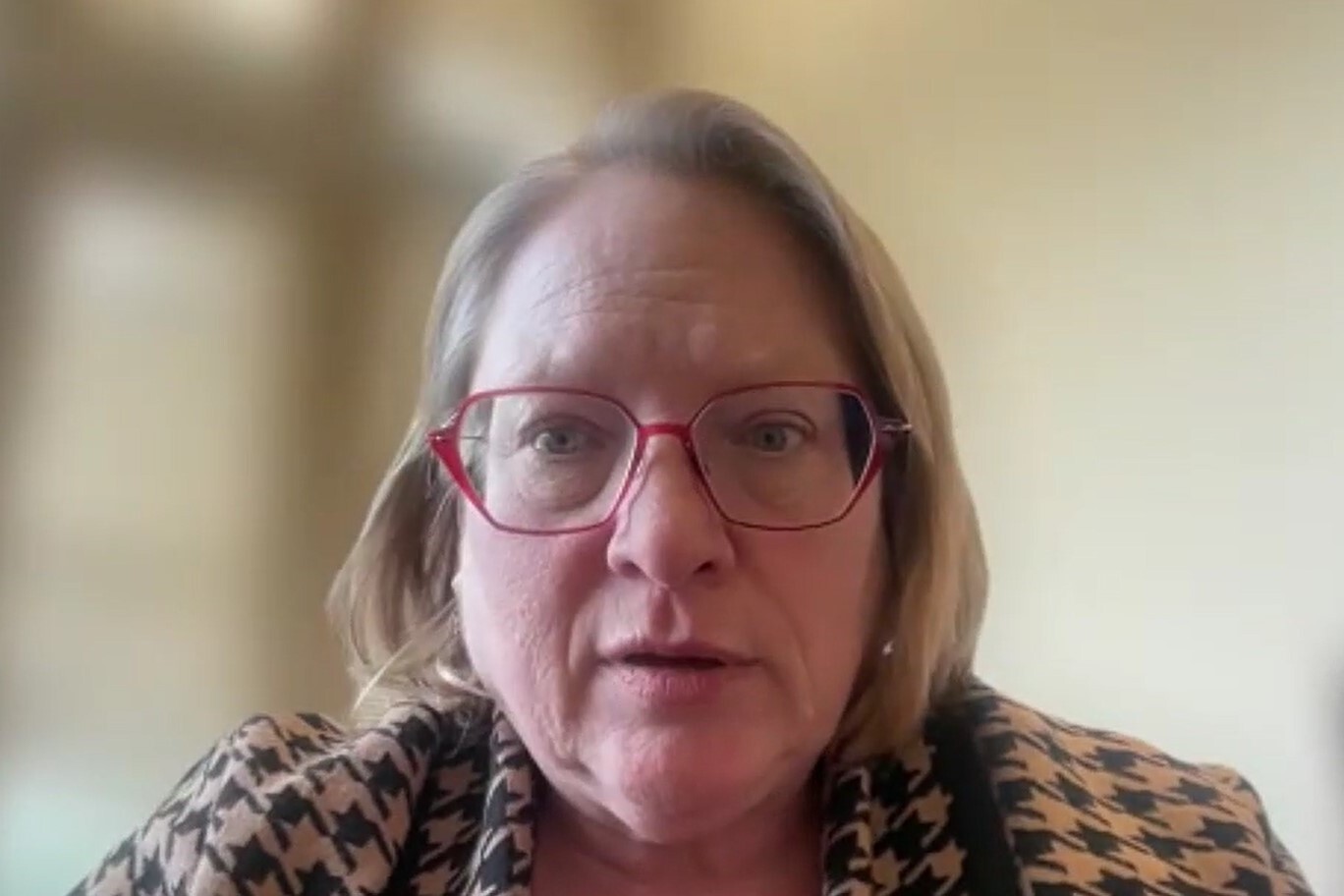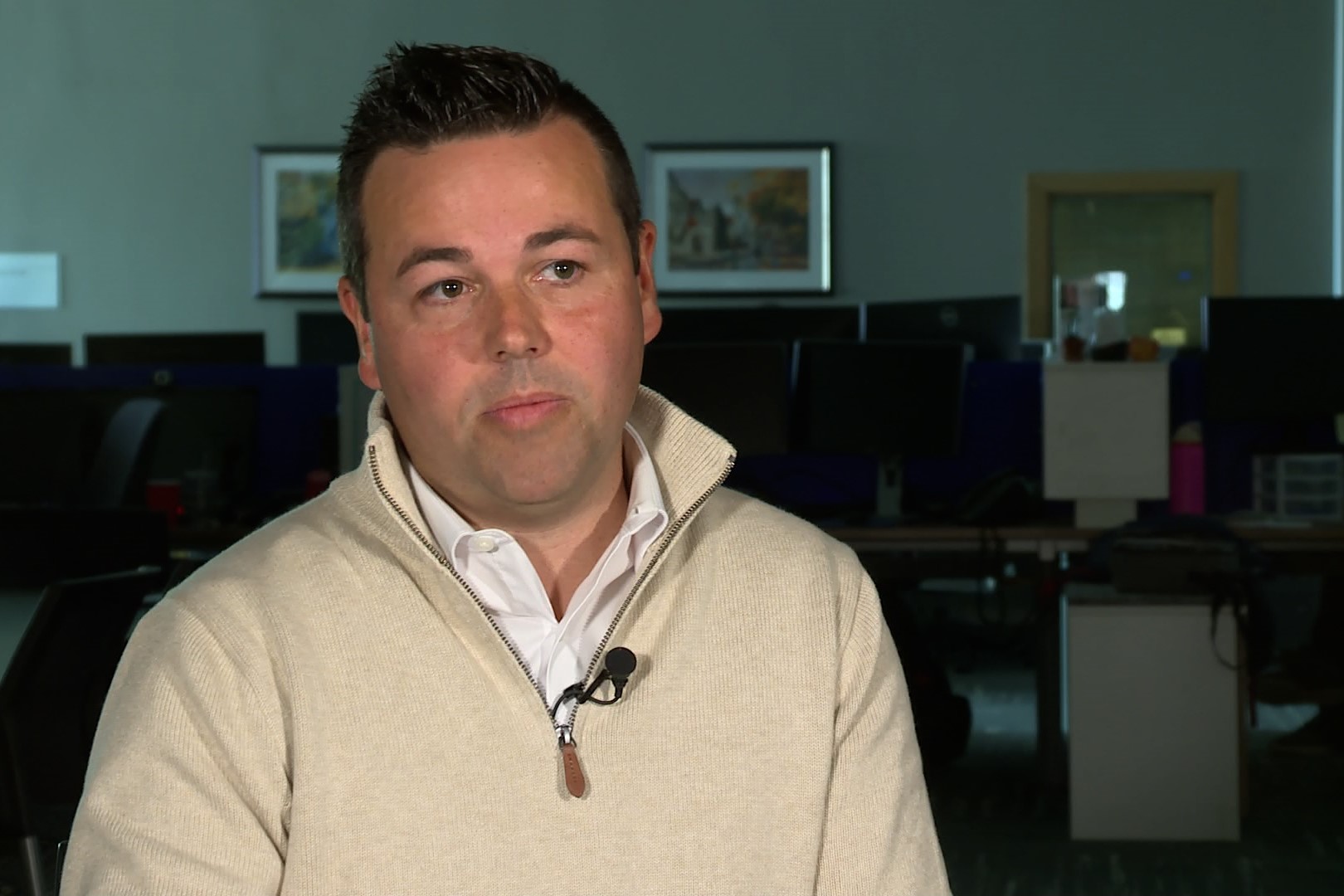
Donald Trump speaking at an Aug 30, 2018, campaign rally in Evansville, Ind. Last weekend, Trump spoke in an interview about his plans to deport people with criminal records and those who have entered the country illegally.
President-elect Donald Trump’s plans to deport millions of people is concerning even legal immigrants. During his last presidency, Trump deported over 1.5 million people.
“What we're really talking about is people who are afraid of their asylum cases being turned down, and people who have never entered the system and are totally undocumented,” said Elizabeth Dunn, director of IU’s Center for Refugee Studies. “And of course, they're terrified of all the things you would be terrified of, losing your job, being separated from your children.”
Two Bloomington women who did not want to be identified because of concerns about what may happen to them talked to WFIU/WTIU News. They chose to go by Mary and Ruth.
Mary came to the U.S. with her husband and three kids from Venezuela to escape persecution and seek stability. She’s been in the country for about three years. Her youngest son, 14, plays soccer on his high school team. She is a cleaner and also delivers meals. It’s a starter job and one of the only options available here.
“[I’d like] a more stable and relaxed job in a company where I have medical benefits and insurance,” she said.
Ruth was in Venezuela and then Colombia before coming to the U.S. She sought economic stability and better opportunities for her three kids. The education system in Venezuela is unreliable; there are teacher shortages, high dropout rates and school conditions are poor. Nearly 8 million have left Venezuela since Nicolas Maduro became president. Ruth is also currently a delivery driver but would like to open her own business.
“I love baking and being able to have the benefits of being a resident and seeing my children stable in their studies and sports,” Ruth said.
Read more: Indiana Restaurant Owner Still Awaiting Deportation
Last weekend, Trump spoke in an interview about his plans to deport people with criminal records and those who have entered the country illegally. He also said he would end birthright citizenship, but would be willing to work with Democrats to protect Dreamers – immigrants who came to the U.S. as children. But Pete Lenzen, director of the Bloomington Refugee Support Network, fears Trump’s plans could still hurt people who have good legal status.
“All these groups of people are scared to death,” he said. “Refugees are afraid that they're going to be deported because they're not citizens, even though they have a very good immigration status and are on a path toward citizenship, people with asylum.”
A portion of the people Lenzen assists come to the U.S. to seek asylum; they have left their country for fear of persecution or harm. Once in the country, they have one year to apply for asylum. An immigration judge reviews their applications so they can be legally recognized as a refugee and seek protection from the threats in their home country. Once the application is approved, they have a clear path to citizenship. But it can take years for an asylum application to be reviewed; the number of pending cases in immigration courts has increased 44 percent since last year, and 3.6 million cases are awaiting review.
“You don’t have permanent status,” Lenzen said. “You have a piece of paper.”
That period of being in limbo, waiting for their applications to be approved is stressful for Mary and Ruth, even if they’re both here legally. They’re afraid of being separated from their kids. Ruth fears she will be deported to Mexico and not be able to come back. Mary is currently working with a lawyer to prepare for her asylum hearing next year but is still scared.
“Even with Social Security and a work permit, can I renew it?” Mary said.
Lenzen tries to reassure those who don’t have good status.
“I advise them to be quiet and make sure their car all the lights are working so the police can't stop for a bad brake light,” he said. “Follow the speed limits, make sure your licenses are current. Don't get in any arguments with people. But I think some of these things are outside our control.”
Lenzen’s organization assists approximately 20 families at a time. It provides financial resources, rental assistance, transportation to and from health appointments and more. It also helps people learn their legal rights. Two families from the Refugee Support Network were deported during Trump’s last presidency.
“We're helping them arrange to have legal advice so that if the father is grabbed and deported, but the children are a U.S. citizen, well, where do the children go?” Lenzen said. “Do they have a guardian, a court-ordered guardian, a family member that can take care of them.”
Mary and Ruth understand and respect the need for deportation laws but think politicians should assess immigrants’ status on a case-by-case basis and prioritize individual conditions.
“Politicians need to consider how we need stability here,” Ruth said. “There’s uncertainty back home.”
Read more: Indiana’s U.S. Senate candidates talk Social Security, immigration and abortion

Lubna Qazi, resettlement director of Exodus Refugee in Bloomington, said she advises people to carry their documents with them to prove they’re here legally. But it’s hard for her to prepare for what Trump might do.
“We can't be completely prepared for what is to come, because as soon as the administration and the office, they'll start signing executive orders and things would start taking place before we have time to challenge it, or try to stop it one way or the other.”
Qazi has put up fliers encouraging people to apply for a green card now, and is also seeking volunteers. If fewer immigrants come into the country, Bloomington’s Exodus location is at risk. They rely on immigrant arrivals to get funds to provide them services. If they serve less than 100 people, they could close down. Bloomington’s Exodus office served 169 people in the last fiscal year, and the Indianapolis location serves hundreds more.
“Another agency who has more capacity, they would rather send those to them and have an agency closed down,” she said. “Exodus Indianapolis office is one. It's been there for a very long time, and it's a very stable office.”
One way Exodus is preparing is by taking in more immigrants and going over capacity.
“This month, so far, we have just our office has welcomed 31 people,” she said. “The capacity of our offices is to manage 10 arrivals in a month; 31 arrivals is way too much for our office, but we are doing this effort because we are foreseeing the number would drop. If the number drops, then obviously we don't get money for our other programs.”
Similarly to the Bloomington Refugee Network, Exodus Refugee helps immigrants find housing, healthcare, enroll kids in school, secure jobs, learn English and more. Many immigrants heavily rely on their mental health services as well.
“They come from PTSD, and then they live in another trauma of what is going to happen,” she said.
Dunn said deporting millions of people could severely harm the economy. Data from 2022 shows that nearly 48 million immigrants live in the country and generated about $1.6 trillion in economic activity. Immigrants most often work in educational and health services, professional and business services and construction. Many immigrants also work in the food industry – picking fruit, meat packing – jobs many Americans don’t want.
“I think the idea that we can somehow deport everyone who is undocumented or whose case gets turned down and still have the economy function is false,” Dunn said. “…People say that undocumented workers drive wage rates down because they'll work for a lower wage, but the truth is, Americans are not competing for those jobs. It's not like if you get rid of all the people coming in from Mexico and El Salvador or Guatemala, all of a sudden, Americans will stream into the meat packing plants or start picking strawberries.”
Qazi stressed the importance of securing more permanent jobs for immigrants so they can earn steadier incomes to be able to afford to live here.
“Bloomington, being a college town, has a lot of seasonal jobs, and it's difficult for our clients to go in, start working, and then there's a break, things close down,” Qazi said. “So, we are trying to find employers who are more permanent and you know, there are no closures like going into small businesses, grocery stores, anything that stays open during the holidays.”
During his last presidency, Trump pushed for more H-2A visas; they allow immigrants to work in agriculture for a period of time. While this has helped keep the food industry afloat, the visas are temporary, and there are still farm labor shortages. Prioritizing H-2A has also slowed the review of other visa applications.
“They [Trump] knew very well that people would overstay those visas, so they let them in legally,” Dunn said. “Then the visa expires, and the people stay and become undocumented workers. And we did this because we needed them to work.”
Many immigrants come into the country legally, but then don’t leave. In 2022, of the 23.2 million of those coming into the U.S. via air or sea, about 853,000 visa overstays were reported. In 2023, about 433,000 immigrants came to Indiana, about 6.3 percent of the population. About 24 percent of those immigrants are undocumented. The immigrant population in the state has increased 4.8 percent since 2013. This concerns lawmakers, such as lieutenant governor-elect of Indiana Micah Beckwith.

“We are seeing a huge uptick in people that don't have legal status here,” Beckwith said. “It's causing a lot of problems. It's overrunning our school systems. It's overrunning our health care systems. And so we've got to get a handle on the illegal immigration problem. It really is a federal issue, but if the Feds won't do it, then the states have an obligation to do that and make sure that they're protecting our citizens here in Indiana.”
Read more: Indiana lieutenant governor: An interview with Micah Beckwith
Dunn noted that Barack Obama deported 2.9 million people during his first term and 1.9 million people his second term, many more than Trump’s 1.5 million and President Joe Biden’s 1.49 million. Obama focused more on undocumented immigrants who posed a threat to the nation, immigrants who had entered the country illegally and those who had reentered the country illegally after being removed. Biden had similar goals, but Trump has prioritized all undocumented immigrants.
In the past, Trump has banned people from Nigeria and Myanmar from coming to the U.S., and could reenact bans for people from those countries, as well as citizens from China and India. Dunn said these full-country bans could create deeper issues.
“What is going to happen to, for example, chemistry labs at Indiana University, which are overwhelmingly staffed by international students?” she said. “What is going to happen to the tech industry if they ban the entry of workers from India?”
Read more: A New Policy Would Deport International Students For Going To School Online This Fall
This story was originally published Dec. 11, 2024, and has been updated with comment from Qazi.











